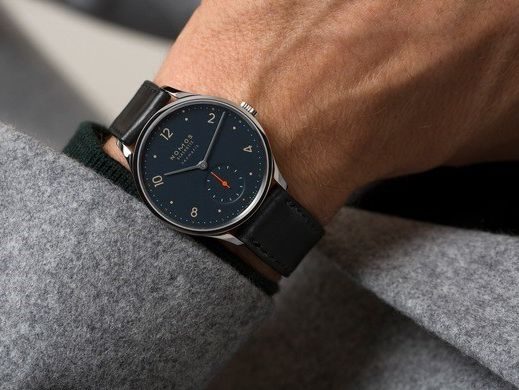Categories more
- Adventures (17)
- Arts / Collectables (15)
- Automotive (37)
- Aviation (11)
- Bath, Body, & Health (77)
- Children (6)
- Cigars / Spirits (32)
- Cuisine (16)
- Design/Architecture (22)
- Electronics (13)
- Entertainment (4)
- Event Planning (5)
- Fashion (46)
- Finance (9)
- Gifts / Misc (6)
- Home Decor (45)
- Jewelry (41)
- Pets (3)
- Philanthropy (1)
- Real Estate (16)
- Services (23)
- Sports / Golf (14)
- Vacation / Travel (60)
- Watches / Pens (15)
- Wines / Vines (24)
- Yachting / Boating (17)
Published
08/05/2021 by NOMOS GlashütteTruly classic: Watch sizes between 33 and 40 millimeters defy fashion trends—and are virtually always the right fit for every kind of wrist.
With an eye-catching dial, striking colors, an elegantly shaped case, and a glimpse of the caliber through the case back—a mechanical watch is always a beautiful choice. Especially when the fine details, namely the strap and clasp, match perfectly too. The selection is flawless, both aesthetically and technically. Aside from one small detail: It doesn’t fit. It can happen, because people and wrists are so different. If the diameter of the watch isn’t right, then the whole watch isn’t right—because size determines the overall aesthetic and how it looks on the wrist. If the edge juts out just that little bit too far over the wrist, then it is likely to encounter knocks and bumps. Likewise, if it is not big enough, the wrist can look bare—or, due to the wrong proportions, much larger than it actually is. The wrong proportions do no justice to the elegant design.
An important piece of advice for avoiding such predicaments: Watches in classic sizes never fail to fit. Thirty-somethings with diameters up to 40 millimeters are as perfect today as they always have been. They are discreet and suitable for everyday wear at work. As elegantly slender, hand-wound watches or as neomatik models (neomatik stands for new automatic, both slender and automatic), they are never bulky and so slip easily under any shirt cuff—underlining the character of the wearer with a quiet confidence.
We’d be delighted to send you further examples of watches in classic sizes for your readers. And if you require more advice on how to find the ideal watch size for any kind of wrist, how strap lengths are calculated, and how the size of a timepiece is crucial to its degree of precision: Just give us a call. You are also welcome to come see for yourself how we produce watches in the 175-year-old tradition of Glashütte watchmaking. We look forward to hearing from you!















